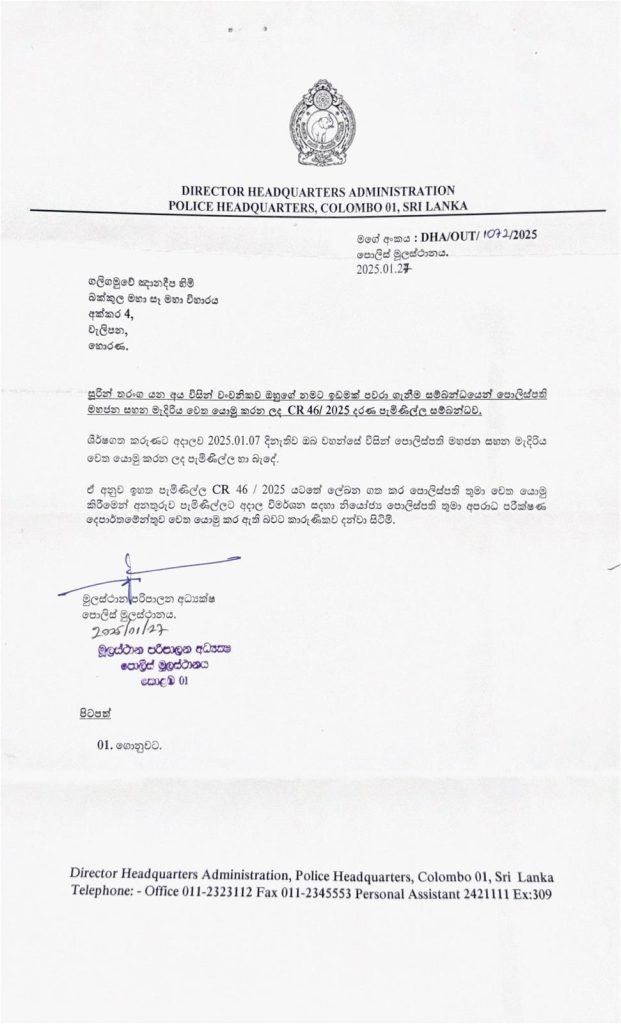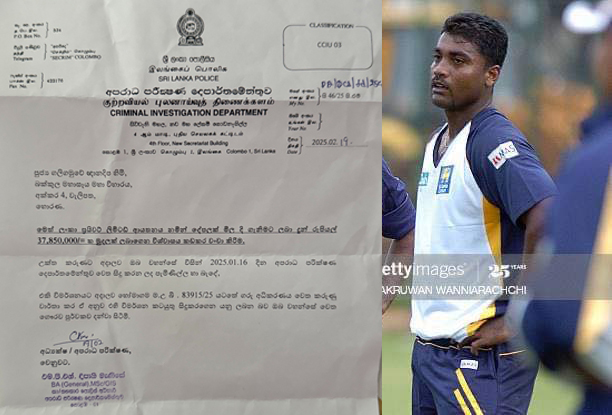Social media reports claiming that former President Mahinda Rajapaksa was hospitalized are false, according to Milinda Rajapaksha. He denied the reports in a post on his Facebook account.
India’s Reliance Life Science Secures Tender for Human Albumin
The Ministry of Health in Sri Lanka has awarded a contract to M/s Reliance Life Science (Pvt) Ltd of India for the supply of 340,000 bottles (50 ml) of Human Albumin Solution. The solution is used to treat low blood volume and low albumin levels. Reliance Life Science was the lowest qualified bidder among two international competitive bids.
Additionally, the Ministry accepted a bid from M/s Slim Pharmaceuticals (Pvt) Ltd., of Sri Lanka (manufacturer: M/s Gufic Biosciences Ltd, India) for the supply of 150,000 vials of Sodium Colistimethate Injection 1,000,000 IU.
The Ministry also approved the purchase of 30 million meters of surgical gauze from 282 local small-scale manufacturers at a fixed price of Rs. 68.97 per meter.
Finally, a contract was awarded to M/s Cliniqon Biotech (Pvt) Ltd., of Sri Lanka (manufacturer: AryoGen Pharmed, Iran) for the supply of 18,000 vials of Trastuzumab Injection 440 mg 20 ml.
Former Chief Minister and Private Secretary Sentenced to 16 Years
Former North Central Province Chief Minister S.M. Ranjith and his private secretary, Shanti Chandresna, were sentenced to 16 years of rigorous imprisonment by Colombo High Court Judge Adithya Patabendige today (02).
The duo was found guilty of illegally obtaining a fuel allowance of Rs. 2,080,500 during Ranjith’s tenure as Chief Minister between 2012 and 2014.
The Bribery Commission filed the case, and indictments were served on April 3, 2023. Following the trial, the court determined that the charges against the defendants were proven beyond a reasonable doubt.
S.M. Ranjith and his brother, former Minister S.M. Chandrasena, are prominent members of the Sarvajana Balaya Party.
Former Test Cricketer Sujeeva de Silva’s Fraudulent Activities Exposed
Former Sri Lankan Test cricketer Sujeeva de Silva is being investigated by the Criminal Investigation Department (CID) for fraudulent activities spanning 23 years. The CID has received complaints alleging that de Silva fabricated documents, including two national identity cards with different birth dates in 1979, to deceive authorities and conduct illicit activities.
Using these forged identity cards, de Silva assumed the role of a company director under different identities and misappropriated payments intended for a foreign satellite channel, leading to the company’s closure. He also obtained passports under different names using these forged identity cards and even used them to obtain US citizenship.
Furthermore, the news report raises questions about the suspicious circumstances surrounding the death of de Silva’s father, whose demise was allegedly concealed from the public. The lack of public announcements or mourning on social media by de Silva and his siblings has fueled speculation about their motives.
The report also implicates de Silva’s family members in fraudulent activities, including his mother and brother, who allegedly used forged documents in property fraud. The CID has initiated investigations into these allegations.


IDAG Launches Video Program for LG Candidates
The Institute for Democracy and Governance (IDAG), in partnership with NMSJ and the Pafferal Organization, has announced that the video program for their “Roadmap Program for Local Government (LG) Election Candidates for a Free and Fair Election” will soon be available in Sinhala, English, and Tamil.
IDAG is set to function as an educational institute focused on leadership development, policy advice, civic education, policy reforms, and public accountability. It will also be an institute that conducts action research on community engagement initiatives and democratic governance. Additionally, IDAG’s primary goal is to create a new generation of young political leaders equipped to face contemporary governance challenges.
More Infomation www.idag.lk | sadharana.org | www.paffrel.com

Prime Minister Amarasuriya to attend 6th BIMSTEC Summit in Thailand
Prime Minister Harini Amarasuriya will visit Thailand to participate in the 6th BIMSTEC Summit, scheduled for April 3rd and 4th in Bangkok. The summit will be attended by leaders of the member countries.
Deputy Minister of Foreign Affairs and Foreign Employment, Arun Hemachandra, will accompany the Prime Minister on her first foreign visit since assuming office.
Meanwhile, Indian Prime Minister Narendra Modi is scheduled to arrive in Sri Lanka on April 4th for a three-day official visit.
Prior to her visit to Thailand, Prime Minister Amarasuriya departed for France yesterday (April 1st) to attend a high-level UNESCO summit. Today, she is scheduled to participate in a session of the International Expert Conference on a Joint and Sustainable Approach to Safeguard the World Heritage of the Sacred City of Anuradhapura, Sri Lanka, and its Associated Living Heritage. The conference is being held at the UNESCO Headquarters with the participation of UNESCO Director-General Audrey Azoulay.
The summit, organized in partnership with Sri Lanka, brings together leading international experts to discuss sustainable strategies for preserving Anuradhapura, a UNESCO World Heritage Site of immense cultural and historical significance.
Alongside the summit, Prime Minister Amarasuriya is also scheduled to meet with senior representatives of the French government to discuss bilateral cooperation and areas of mutual interest.
Deshabandu to Resign Amidst No-Confidence Motion
Inspector General of Police (IGP) Deshabandu Thennakoon is reportedly preparing to resign. This comes ahead of an impending no-confidence motion against him in Parliament.
Thennakoon’s close associates have advised him that resigning before the no-confidence motion is passed and he is removed from office would be the more appropriate course of action.
The IGP is currently being held at the Bogambara Prison under a court order extending his remand until the 3rd.
Sri Lankan President Rejects Adani Power Deal, Demands Lower Price
President Anura Kumara Dissanayake has taken a firm stance against the power purchase agreement for the Mannar wind power plant with the Adani Group. He stated that his government will not proceed with the deal unless the company agrees to the government’s proposed price of US$ 4.57 cents per unit. This price is significantly lower than the US$ 8.26 cents per unit agreed upon by the previous government.
The President highlighted the cost difference, which translates to Rs. 13 per unit instead of Rs. 25, and questioned the whereabouts of the additional costs, suggesting corruption in past administrations. He dismissed calls to proceed with the previous agreement, emphasizing that his government will only move forward if the company accepts their terms.
The Adani Group had previously withdrawn from the $442 million wind power project in Sri Lanka due to attempts by the country’s authorities to modify the agreement.
Electricity Board Accused of Promoting Solar Power Monopoly
Electricity experts have raised concerns that the Ceylon Electricity Board (CEB) is attempting to limit the supply of electricity to the national grid from rooftop solar panels installed by the general public. They also allege that the CEB is planning to purchase solar power from large-scale companies instead.
This suspicion appears to be confirmed by CEB circular 2025/DCC/COM05, which was issued in English only. The CEB has been accused of favoring the purchase of electricity from private companies over government-owned hydroelectric power plants.
Previously, the CEB allowed the general public to install solar panels up to 40 kilowatts on their rooftops and sell their surplus electricity to the CEB under the net metering scheme. Currently, around 100,000 homes have installed such solar panels, which added approximately 600 megawatts to the national grid by the end of 2024.
Experts argue that this move to restrict solar power generation by the general public and promote large-scale companies is an attempt to deviate from the plan to generate 70% of Sri Lanka’s electricity demand from renewable energy by 2030.
Further supporting their claims, experts point to a recent cabinet paper presented in early March that approved the transfer of cultivated land in the Siyambalanduwa area to a Singaporean company, designating it as wasteland. Additionally, there are preparations for the Indian Prime Minister, who is visiting Sri Lanka on April 5th, to sign an agreement for a 50-megawatt power plant in Sampur.
Government to Register Private Tuition Teachers
The government has reportedly prepared a plan to register private tuition teachers. This process will operate under a proposed Teachers’ Council, and proposals for the plan will be presented to the upcoming Cabinet meeting.
After registering, teachers will receive a registration number from the Teachers’ Council. Unregistered teachers will not be allowed to engage in teaching activities. This step aims to regulate private tuition classes, with the first step being the registration of private tuition teachers.










